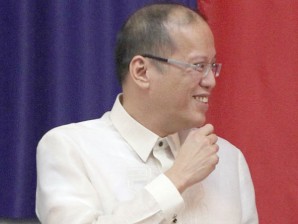‘Cha-cha’ party a flop at Palace

Mr. Aquino wants a study that would show if amending the Constitution would really be beneficial to the country.
President Benigno Aquino on Monday dissuaded the top two leaders of Congress from pushing through with Charter change (Cha-cha), reiterating his public pronouncements that this was not a priority of his administration.
The President met with Senate President Juan Ponce Enrile and Speaker Feliciano Belmonte in Malacañang, where he officially informed them of his opposition to any attempt to amend the Constitution that was drafted and ratified during the term of his late mother, former President Corazon Aquino.
“I stated my opposition, but we agreed to have the underlying basis studied by the economic and legal clusters [of the Cabinet and] with private sector participation, upon the suggestion of both the Senate President and the Speaker,” Mr. Aquino said in a statement read at a Palace briefing by presidential spokesperson Edwin Lacierda.
Enrile and Belmonte, who had sought the meeting, failed to convince Mr. Aquino to change his mind.
“I cannot venture an opinion whether that study will yield to what conclusion and what actions the President will take on those conclusions,” said Lacierda.
Article continues after this advertisementThe presidential spokesperson provided no specifics for the study ordered by the President, but Enrile and Belmonte had earlier said that Cha-cha would be limited to the supposedly restrictive economic provisions of the Constitution.
Article continues after this advertisement“We don’t know exactly what economic provisions they are considering. I don’t have the details but certainly… it would have a discussion on the economic provisions primarily because the economic cluster was asked to be part of the study,” said Lacierda.
The Constitution mandates a 60-40 business equity sharing between Filipino and foreign investors in favor of the former, banning total foreign control over the exploitation of natural resources of the country.
Belmonte, in a text message, said he continued “to nurse hopes,” after the meeting with the President.
Belmonte did the talking
Enrile said it was Belmonte who did most of the talking at the meeting.
Enrile admitted he left the meeting believing the President had “maintained his present position,” referring to Mr. Aquino’s opposition to proposed amendments to the Constitution.
But he noted that Mr. Aquino’s promise to have the proposed amendments to the economic provisions checked by the National Economic and Development Authority (Neda) could be gleaned as openness to the idea.
“He gave us a hearing and, upon our request, agreed that it be submitted for study by the economic managers of the nation,” the Senate President said in an interview after the meeting.
“That is proper in order to determine whether indeed there will be a benefit to the country if we do the (Charter change) exercise,” he added.
Enrile described the meeting in Malacañang as “very friendly, very cordial” and got the impression that Mr. Aquino wanted the Neda study to end “in the shortest possible time.”
He also said the President exhibited fairness by allowing Neda and “other stakeholders” to examine the proposals that Congress leaders laid down at the meeting.
It was Enrile who initiated the latest revival of Charter change when he blamed China’s incursions into Philippine territory to the non-negotiable priority that the Constitution gives to education.
He said that were the Constitution more flexible and responsive to situation that the country faced right now, a military budget higher than the allocation given to education would not be considered unconstitutional.
Later, however, Enrile said the amendments should center on making the Charter more flexible on the ratio of local and foreign investors in Philippine-based businesses.
Majority Leader Neptali Gonzales II, who was at the meeting, noted that the President did not give an outright “no,” and agreed to the suggestion of Congress leaders to have his economic cluster look into whether there would be actual benefits to the proposed changes to the economic provision.
No movement in House
Mr. Aquino wants a study that would show if amending the Constitution would really be beneficial to the country.
While the study is ongoing, there would be no movement in the House regarding Charter change, Gonzales said.
The lawmaker said he suggested that the economic cluster complete its study before the end of the year, as 2013 is an election year. This way, there would be time to pursue the changes to the Constitution should the cluster come up with a favorable recommendation.
Gonzales also said that since the President had already made his position on Charter change known early on in the meeting, the discussions did not reach the point of tackling the method proposed by Congress.
Congress leaders earlier said they just wanted to add the phrase “unless provided for by law” to the Constitution’s economic provisions. This way, other specific changes could be made by passing a law.
Gonzales earlier said that the time was ripe for Charter change because of the high public trust for the President and the leaders of Congress. Because of this, the people are less likely to be suspicious about their motives.
Previous attempts to amend the Constitution had been met with opposition from the public, who suspected that leaders were pushing for the move in order to extend their stay in office.